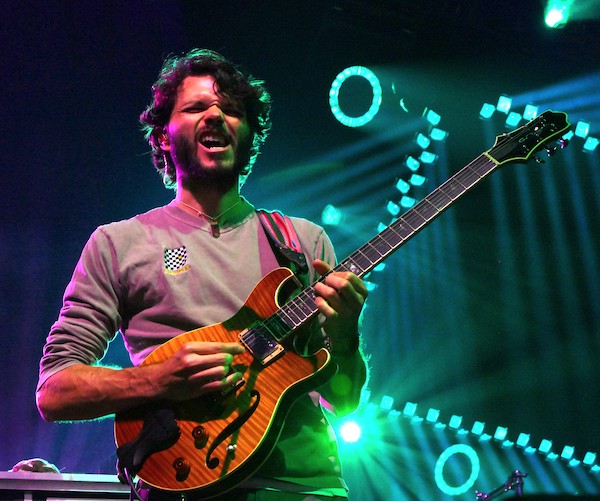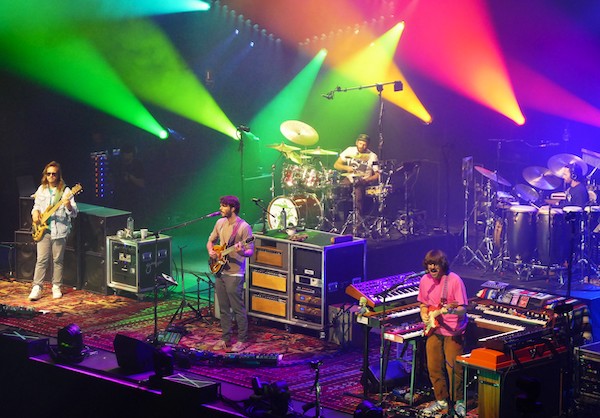Concert Review: Goose — More Immersive Than Ever
By Paul Robicheau
Goose’s three nights seemed a bit hit-and-miss, which is not unusual for jam-bands, although that only made highpoints more exhilarating.

Rick Mitarotonda of Goose at MGM Music Hall at Fenway. Photo: Paul Robicheau
Goose leads a new generation of jam bands, making the right moves to crack the genre’s elusive mainstream. That naturally includes different songs each night, arranged in two sets, and sporting expansive jams — and a trippy light show to match. But it’s not that easy. Obviously, a band also needs musical dexterity (the Goose guys even went to Berklee) and chemistry to pull it off. The Connecticut-bred Goose even took the risky step of changing drummers in the past year – moving on from Ben Atkind for “creative differences” to add Vermont-based Cotter Ellis — without losing a step in its musical trajectory.
A mix of luck and marketing savvy (Goose began its ascent through booking outdoor pod shows during the pandemic) doesn’t hurt either. Rather than play one show at a big amphitheater like surrounding stops on its fall tour, Goose began this week by performing for three nights at the 5,000-capacity MGM Music Hall at Fenway. The decision played to a fervent fanbase that thirsts for multiple shows in one place, much like forebearers Phish proved an even hotter ticket than usual with three nights at Mansfield’s Xfinity Center in July.

Trevor Weekz of Goose at MGM Music Hall at Fenway. Photo Paul Robicheau
Coming off Labor Day, none of Goose’s MGM shows were completely sold out, yet they were all packed, with fans mooing “Goooose!” after favorite numbers. Granted, the three nights seemed a bit hit-and-miss, which is not unusual for jam-bands, although that only made highpoints more exhilarating. The shows scattered just enough trademark burners, a few far-flung covers and a handful of proven tunes from Goose incubator bands, plus the Ellis-sung “My Mind Has Been Consumed by Media,” a driving ditty by his prior band Swimmer.
Lead guitarist Rick Mitarotonda once dominated the spotlight as the lightning rod for the band’s energy. Yet he appeared more meshed within the ensemble fabric at MGM, while Ellis blended in with a polyrhythmic approach. The guitarist still proved the most levitating element, yet when the band cranked, his solos would cycle in a rise-and-fall wash of often same-sounding jams that could have used more clarity and separation between instruments.
However, taking a cue from Phish, Goose really stepped it up when it came to its light show — a morphing, symmetrical palette of colorful pinwheel sprays, roving beams, and cube-cast curtains (as well as pillow jets of smoke) that synced with the music to bolster the ride for a more immersive experience.
The band eased into Monday’s opening show with the feathery “All I Need” and a rather undistinctive cover of Bob Marley’s “Caution” before debuting new song “One In, One Out,” percussionist Jeff Arevalo taking on guitar while Peter Anspach focused on piano through a percolating jam. A trio of tunes that migrated from Goose precursor Vasudo dominated the final stretch, hitting the set’s most intense peak to interspersed, twinkling strobes in “Rockdale.”
For better or worse, Monday’s second set stretched further, bookended by 20-minute helpings of “Hot Tea” (with its scatting accents and hopped-up climax) and the relaxed build of “The Empress of Organos.” But perhaps “Tumble” best showed how a repetitive groove could eventually pay off as it slowly evolved into funky, frothy tension, Ellis lending a dancing touch under Mitarotonda’s biting guitar figures. The guitarist’s plaintive vocals likewise found a perfect home in a sublime cover of Bruce Hornsby’s “The Way It Is” that highlighted Anspach’s bright, sprawling frolic on the electric piano in his cove of keyboards.
On Tuesday, the band uncorked a particularly strong first set. Mitarotonda stood out from the start with breaks of fleet licks and stinging sustains in “Dr. Darkness,” then graced a cover of jazz guitarist Wes Montgomery’s “Switchin’” with sliding chords and melodic chatter in sync with Arevelo’s congas. “Atlas Dogs” found Ellis deviating from his snappy ride-to-crash cymbal routine to lay pattering rhythms across his toms. Stoic bassist Trevor Weekz shifted from his effortless lines to drop bombs toward the end. And “Time to Flee” came about as close to Phish’s abstract flow as the more straightforward Goose gets, iced by winding guitar harmonies from both Mitarotonda and Anspach, even if rhymes like “elevator” and “alligator” came off as too cute.

Goose at MGM Music Hall at Fenway. Photo: Paul Robicheau
Likewise, the bass-thumbed “Yeti” served up a playful romp that found Anspach (who hatched the song in his old band Great Blue) hopping in place and dancing in circles with his guitar, while others joined in, piping “Yeti! He’s coming for you.” In contrast, “Butter Rum” bopped its way into a ferocious, scale-scraping jam, in the same way that the nerdily named “Elmeg the Wise” capped Tuesday’s second set. But, in between, Anspach keyed a nice change of pace on piano with “Red Bird,” though when the pensive song was stripped down to his naked vocal, it yielded a weak transition before others chimed in on the chorus, “It’s time for a bird to fly.”
For Wednesday’s MGM grand finale, the quintet pulled out major numbers like “Wysteria Lane” and the title track to its indie rock-courting album Dripfield (while leaving other biggies like “Hungersite” and “Arcadia” on the table for future tour stops). A monster, “Thatch,” also began the second set, building its gnarly guitar lick to inspire an incessant, stuttering jam that seemingly went nowhere yet had a momentum that couldn’t be denied.
The quintet also secured sure footing and surprising sparks in the first set’s stylistic diversity of Jorge Ben’s Brazilian samba “Mais que Nada” (popularized by Sergio Mendes, who coincidentally died a day later), the reggae-fied “Doc Brown” and a patient, synth-glazed jam down “Indian River.” And the night ended with a breezy “Shama Lama Ding Dong” by the fictional R&B band Otis Day & the Knights from frat-house film comedy Animal House. No food fights ensued, but Goose made a point to close their three-night MGM party on an appropriate note.
Paul Robicheau served more than 20 years as contributing editor for music at the Improper Bostonian in addition to writing and photography for the Boston Globe, Rolling Stone, and many other publications. He was also the founding arts editor of Boston Metro.
